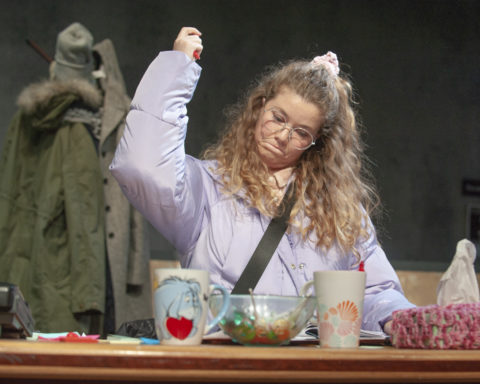 Originally published in the Bay Area Reporter
Originally published in the Bay Area Reporter
One wall of the dingy, cluttered Washington, D.C. proofreaders’ office where most of “Washed Up on the Potomac” takes place is plastered with a multi-colored mosaic of Post-it notes. It’s an inventory of scribbled inspirations that Mark (Vincent Randazzo), an aspiring novelist, has extracted from conversations among his workmates: ear-catching turns of phrase, philosophical musings, onomatopoetic blurts.
Like Mark, playwright Lynn Rosen slices, dices and juliennes the banal chit-chat of unmotivated office workers, then arranges the bits and pieces into appealing rhythmic patterns and repetitions. “Washed Up,” making its world premiere as part of San Francisco Playhouse’s Sandbox Series of new works, is best appreciated as language jazz.
The players in director José Zayas’ thespian quintet bounce lines off each other with perfectly timed pauses and sharply expressive english on their English. Their linguistic sync is all the more impressive knowing that Melissa Quine, playing office wallflower Sherri, took on her role less than a week before opening night, replacing the original actress, who had a family emergency.
While Rosen’s experiment in collage works well at turning words into music, it’s much less successful when it comes to storytelling. Narratively, there are too many ideas stuck up on the wall. “Washed Up on the Potomac” cobbles together tropes of tabloid conspiracies, television sitcoms, horror stories, romances, and personal growth drama into a hectic hash of a story that points in many directions, but never really gets anywhere.
While nodding to the deferred artistic dreams of Mark and his aspiring rock star deskmate Kate (Jessica Bates), the play’s title also refers to a former office employee who disappeared a year earlier, and whose dead body may have just been found on the riverbank.
Do the eerie creakings and sputtering lights that open the play and sporadically appear throughout suggest the group is somehow haunted by their counterpart? When Sherri seems to step into a river during her closing fantasy monologue, are we intended to hear a Virginia Woolf-whistle?
The never-solved mystery of the maybe-drowned woman proves less a through-line than a distraction, as does Sherri’s contentious, “Carrie”-esque relationship with her Bible-thumping mother, relayed through a series of hostile phone conversations.
More engaging are the intertwined comic flirtations of Mark, Kate, Sherri and an unnamed copywriter (Max Forman-Mullin) who spends most of the play behind a pane of frosted glass obsessing over origami – his own means of transcending the soul-killing monotony of office life. But these, too, go largely unresolved.
The play’s fifth character, Giorgio (Cole Alexander Smith), is a tightly-wound office manager who both resents and admires the would-be artists he’s assigned to. He allows playwright Rosen some intermittent observations on class tensions within the workplace.
“Washed Up on the Potomac” suffers from Shiny Object Syndrome, a relentless flittering back-and-forth between emotional tones and story forms. Rosen is a wickedly talented craftswoman, but this script feels ostentatious in its display of her virtuosity. For an audience, it’s exhausting.
Running about 100 minutes with no intermission, “Washed Up” feels a good 30% longer than it should be to showcase its best qualities, which are pretty terrific. In a shorter form, the play’s sonic rhythms and verbal wit could make for an exhilarating experience. In its current state, however, it leaves the audience feeling drowned in the playwright’s ambitions.
